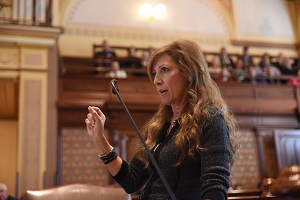
Aurora domestic violence shelter finally gets funding under Senate budget plan
- Details
- Category: News
SPRINGFIELD -- An Aurora domestic violence shelter that has suffered through layoffs and service cuts amid the state’s financial crisis, could finally see stable state funding that could restore vital services to abused women under a plan the Illinois Senate recently approved.
“Mutual Ground and those that they serve have already paid a steep price for inaction and gridlock in Springfield,” said State Sen. Linda Holmes, an Aurora Democrat. “The plan that I voted for would fully fund Mutual Ground, giving them the certainty that they need to serve some of the most vulnerable people in our community.”
The Senate’s balanced budget plan restores funding for human service organizations that have been left guessing as to how much, if any, state funding they will receive the past two years. Mutual Ground, other domestic violence shelters along with programs for breast and cervical cancer screenings, addiction treatment and mental health services have all suffered during the state’s budget impasse.
The breakthrough Senate plan would budget more than $370,000 in state funding to Mutual Ground in the budget year that begins July 1.
Illinois has gone without a full budget since Bruce Rauner became governor in 2015. Mutual Ground did not receive funding in the 2016 emergency budget and has gone two years without any assistance from the state. The Senate, with Holmes’ support, recently approved a balanced budget that relies on a mix of cuts and new revenue to wipe out a more than $5 billion deficit in the unbalanced budget plan Governor Rauner proposed earlier this year.
While the budget stalemate played out at the Capitol over the past two years. Mutual Ground lost 10 staff members to attrition and layoffs. As a result, it was forced to turn people away and do more with less staff, leading to a high burnout rate in an already challenging field.
Mutual Ground is a nonprofit serving the Greater Aurora area, Southern Kane County and all of Kendall County. The mission of the organization is to provide education, awareness and services to empower individuals, families and communities to stop domestic and sexual violence.
“For too long, political games have gotten in the way of progress and Mutual Ground’s struggle illustrates the very real consequences of the budget crisis. The Senate took action to restore stability and end the chaos. I hope that the Illinois House and Governor Rauner will follow our lead and do the same,” Holmes said.

Sen. Holmes votes for balanced budget
- Details
- Category: Latest
SPRINGFIELD – State Sen. Linda Holmes, D-Aurora, voted today to approve a balanced budget for 2018. If signed into law, it would end Illinois’ historically long budget impasse.
“Today, I voted for a solution,” Holmes said. “After more than two years without a budget, we finally have a plan that fully funds the services and grants that people rely on in the 42nd district and across the state.”
The budget fully funds programs including breast and cervical cancer screenings for underinsured women, domestic violence shelters, mental health programs and addiction treatment. Additionally, the budget reinstates grant programs, dedicating $4.3 million for autism support, $1 million for addiction prevention programs and $364 million for MAP grants.
Holmes emphasized that voting for the balanced budget is the responsible thing to do for Illinois, as it would put an end to a lengthy budget crisis that has created chaos across the state.
“This plan spends only as much as Governor Rauner had planned to spend in his budget proposals,” Holmes said. “Unlike Governor Rauner’s most recent proposal, it uses a combination of cuts and revenues to achieve balance. By approving this plan, we have done our part to give the people and businesses of Illinois the stability and certainty that they deserve.”
The Illinois Senate approved six measures that would implement and fund a budget for fiscal year 2018. The measures will now go to the House of Representatives for further review.

Plan to streamline purchasing for fire protection districts passes Senate
- Details
- Category: Uncategorised
SPRINGFIELD – Thanks to a measure introduced by State Sen. Linda Holmes, D-Aurora, fire protection districts will have easier access to tax increment financing (TIF) funding in order to keep up with developing business districts.
“As TIF districts improve the business environment, growth naturally follows,” Holmes said. “This legislation will make it easier for fire protection districts to keep up with firefighting technology so that they can adequately respond to fires in new development areas. For example, if a tall building is built in a TIF district, a fire protection district would have a much easier time getting the funds to purchase a ladder truck.”
The legislation is an initiative of the Illinois Association of Fire Protection Districts (IAFPD). It would allow fire protection districts to request funds directly from the TIF’s review board instead of the municipality, as long as the purchases are reasonable and necessary to protecting the more advanced infrastructure that TIF districts bring. According to Chuck Vaughn, the legislative representative for the IAFPD, the measure is meant to make the process of purchasing new equipment more responsive to the changing needs of those that they protect.
“Senator Holmes recognized that taxing districts such as fire protection districts often get new responsibilities created by a TIF district,” Vaughn said. “The senator’s bill makes the process more responsive to changes that a TIF district brings to a fire protection district. The IAFPD is extremely grateful for the leadership that Sen. Holmes has put into this project. The end result will be better and more responsive decisions to meet the test that a TIF district will present for fire protection.”
Senate Bill 1415 was approved by the Illinois Senate today. It moves to the House of Representatives for further consideration.

Sen. Holmes statement on automatic voter registration
- Details
- Category: News
SPRINGFIELD – State Sen. Linda Holmes, D-Aurora, released the following statement after the passage of Senate Bill 1933, which would bring automatic voter registration to Illinois:
“Automatic voter registration is important to the health of our democracy. There are so many existing roadblocks to participation. Something as basic as registration should not be one of those roadblocks. I am dismayed by how low voter turnout is, especially in local elections, and I believe that automatic registration will give more people an opportunity to let their voices be heard in the political process.”
More Articles …
Page 69 of 85




